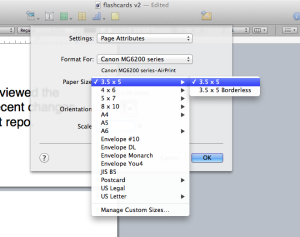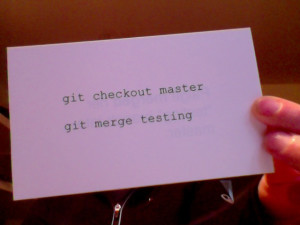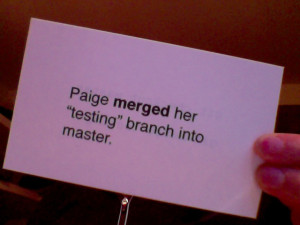Flora Worley organized a fantastic PyLadies PDX meeting called “Negotiating the job market: a panel discussion“.
The meeting was organized in three parts:
- Experiences (good, bad and ugly) from four women who entered the software industry in the last 1-2 years.
- Managing expectations and setting boundaries from three people, two recent entrants into the industry, and me.
- Negotiating the application/interview/offers process (which we turned into a group discussion, led by one panelist)
We kicked things off by asking people to get into groups of four and talk to each other about why they came and what they were hoping to get out of the meeting.
Some of the comments from the meeting and feedback after included:
- On what was good prep for interviewing: Attending PyLadies and Python User Group meetups to learn new skills, hear about what modules and techniques people are using. (from Amy Boyle, a local developer)
- Attending PyLadies helped fill in gaps in knowledge useful as a working programmer, even after having a CS degree.
- “I love being a Pylady, and if it weren’t for this community, I honestly don’t know that I would have continued learning to code.”
Below are my notes from the first panel, anonymized and edited a bit.
How did you find your first job in the industry and know it was the right place for you?
- I knew a founder of the company from college
- Knew someone and they invited me to apply. Wrote a great cover letter and got an interview even though they thought I didn’t have the skills for the exact job I applied for.
- Got the job by going to talks and staying and talking to the speakers.
- Decided I was more interested in data than my major! Looked around and found a company that was doing a lot with data.
At what point do you say you “know” a programming language?
- I shy away from saying I “know” something — seems presumptuous to say that the same way it seems weird to say “I’m a writer.” If you’re getting paid to do a thing, though, then you get to call yourself the “thinger”. Coworker has been asking me for help with python and I know the answers to his questions so…
- Finding ways to help others with things is a good way to boost your confidence.
- Once I give a talk about something, I have to say I know how to do it because people will come to me for help. It’s a way to force yourself to cram, find out what you know and really don’t know. On my resume I don’t say “I know” — I say “I have experience with XYZ; I have managed to learn these things to get the job done.” Most technical interviews ask more general questions.. not exact syntax of a language.
- Interviews seem to be trying to figure out if you can learn whatever it happens to be that they need you for at the job.
- We have to support many languages. So many languages at the same time can get overwhelming.
- I don’t say I’m an IOS programmer, but I help people write and improve their IOS code all the time.
What was your interview like?
- Shared projects I made. We just went through my github repo. Tell me about this project, what did you do, what did you use.
- Was interviewed over Skype
- Interviewed with 4 people in a marathon. None of those interviews were super technical.
- The interviews seemed to be gauging whether you would be able to just talk about whatever comes up.
- They asked me about a lot of command line skills and brought lots of people in from different parts of the company.
- The interview had me sit down with a program — there’s a bug in this program solve it. What I learned is what matters is the process of how you work on bugs — and being able to communicate that while you’re doing it, not that you actually fix it.
- Most valued skill is resilience rather than a technical background. You can learn, compensate, fill in gaps. Need willingness to learn, capacity to be frustrated/despair and just move on. People don’t want to hear you freaking out, just want you to do it. Even if it takes you a long time.
Were there classes or resources that prepared you for interviewing?
- Go out and make something for yourself. Nothing better than finding a thing you want to make, and then making it. Going back to old code, really fulfilling to see progress and wanting to make old code better. You have something to share!
- Coming to meetings like PyLadies and the Python User Groups. I took some CS classes, but there was lots that I missed. You don’t realize how much you don’t know! Get to meetups to hear about what others are using, what is current in the field. Having a sense of with what the latest stuff is, what are good blogs, best practices, helps out. (seconded by another panelist)
- Very helpful to go to PyLadies and talk with people around my same experience level. In conversation, people would explain stuff to you in a way that made sense, not just a bunch of jargon.
- Learning that ecosystem and what tools people use is huge. Helps you figure out what a job entails and what do you need to know to build it.
- For most of the stuff you’ll build, you’re going to use other libraries. It helps having experience mushing things together. Iterate on it. Every little thing you learn, you’ll find ways of improving stuff.
What if your coding style is really different than other people’s? How do you handle that?
- Get good at giving constructive feedback
- “days of spaghetti code is behind us” at the mercy of other people’s crappy code — tech companies deal with this a lot less.
- Don’t be afraid to say “no idea what this function ” learned a lot about better code by reviewing a lot of code
What kinds of positions can you get? And where do you want to go?
- Really overwhelming to learn everything I needed to know to support product. It’s an all guys team, learned to love them all, took on a mother role.
- Teaching stuff all guy team can be intimidating, but most of the guys I work with are college educated CS guys, me having no CS background was intimidating until I realized I knew and could learn this stuff as quickly as they could. No CS didn’t matter.
- I’m doing tech support, wish I could do more coding. It’s a mixed bag doig support, you learn a lot about system. Found that management wanted everyone to level up in tech support and not go to other parts of the company. I’ve had to come to terms with managers trying to keep me in that role. Need to see how long they expect you to stay in that role before you can move on — ask up front.
- Had similar experience — resistance to moving from tech support into other roles. Most people in support are looking to move into another role. Make sure you’re on the same page with manager rather than be surprised by it later.
- On working with guys: my communication style was not really effective when I started. Sometimes had customers that said “can I talk to tech support?” “can I talk to an engineer?”. Had to learn how to be kind of cocky — “This is how this works.” If I was wrong, I was wrong, and had to fix it but that was much more effective at communicating with customers and coworkers.
- Had to learn that nothing wrong with asking for help. Saves a lot of time.
- Everything takes me longer than I think it will. Triple your estimates!
- I needed to learn its ok to ask questions, ask questions confidently rather than despair of never being a programmer. We all tell ourselves crap like: “i’m just generally stupid and can’t learn anything” or “can’t learn javascript in a day, so clearly i’m an idiot”. But turning that around is important for yourself.
- Be dilligent in the way you ask questions: 1) first google it, stack overflow, check reference book; 2) write out the question fully (rubber ducking) — articulate the problem fully and you might solve it for yourself — what did i expect, what happened, what else can i expect….
- I’ve had people say to me: “I don’t know why pyladies needs to exist.” I said: “I think its nice its a safe place where that you can articulate your questions without fear.” I don’t know what to do about it other than say that.
- Men might be made clear to you that they believe we are post-sexist, post-racist. If you have too many of those people around, find a new job.
- “you need to be careful about where you are” when expressing opinions about feminism.
- Be open and honest, and they tend to understand.
- Sometimes it may be the case you have to figure out if an opinion is being expressed because of privilege or malice. If privilege, it can be worked on.
- Try to internalizing confidence. Tell yourself: “I know how to program” more. Once I really believed that, my programming got better. Because I know I will solve the problem I’m working on!
Do you find that as a woman you communicate differently and you are interpreted differently?
- Here’s an example: when someone says: “Can you pass the salt?” One person might respond by thinking, “I understand you’re being polite and phrasing that request as a question rather than a command. Sure, here’s the salt!” Or another person might respond with, “I could pass the salt to you. Is that actually what you want me to do?” Pretty different communication styles.
- Try to be flexible and ride out conflict.
- I question myself a lot — did i interrupt too many times, was i too aggressive. I worry I am too aggressive.
- Be yourself. Take time to figure out if you are happy or not.
- Try to compromise and avoid “truth bombs” where you “explain how the world is”. Take conversations case by case and try not to take it personally.
- If it gets to be too much, get out of there!


